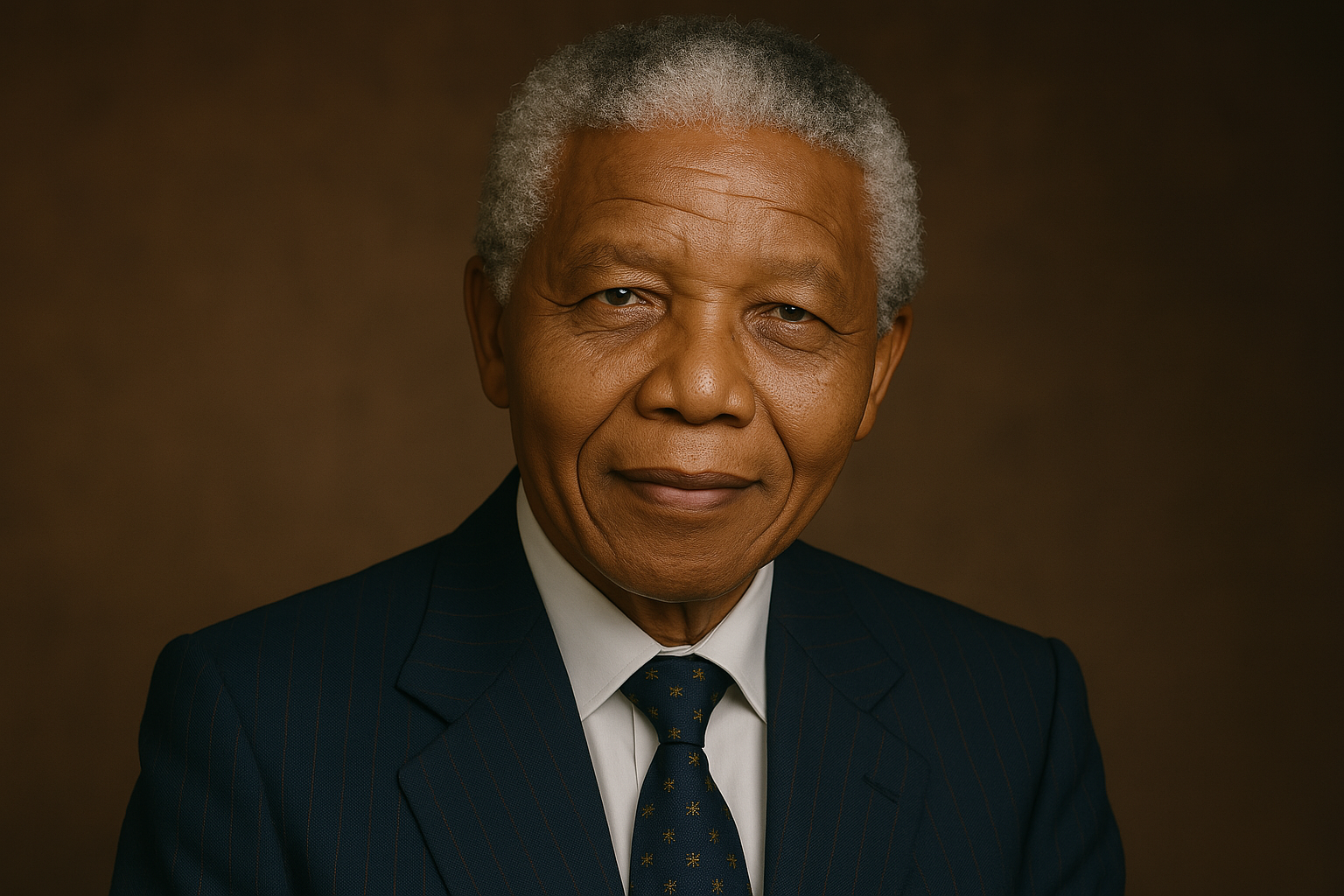1. Introduction
Nelson Mandela, a towering figure in the struggle against South African apartheid and the country’s first democratically elected president, is synonymous with resilience, reconciliation, and transformation. Revered worldwide as an icon of peace and justice, Mandela led South Africa through an extraordinary transition from decades of institutionalised racial oppression to an inclusive democracy. His extraordinary ability to lead with dignity, humility, and compassion established him as one of the 20th century’s most charismatic and influential leaders.
Mandela’s charisma was rooted not only in his extraordinary life story but also in his ethical principles and ability to demonstrate empathy in the face of overwhelming adversity. As a leader, he rejected bitterness and revenge, even after enduring 27 years in prison, instead advocating for unity, forgiveness, and negotiation. Such qualities made Mandela a model of transformational leadership, inspiring both South Africans and the global community.
This whitepaper explores Mandela’s charismatic traits, the positive aspects of his leadership, critiques of his approach, and the lessons modern leaders can derive from his legacy.
2. Mandela’s Charismatic Traits
2.1 Moral Authority and Ethical Leadership
Mandela possessed an unparalleled moral authority derived from his unwavering commitment to justice and equality. His life represented the triumph of principle over personal self-interest, lending profound credibility to his leadership. Even in the oppressive climate of apartheid South Africa, Mandela remained steadfast in his pursuit of freedom for all people, regardless of race.
This moral clarity was accompanied by ethical leadership, as Mandela consistently prioritised what he viewed as the greater good. For example, during his presidency (1994–1999), Mandela adopted policies that may not have been politically expedient for certain sectors of his constituency but were essential for national unity. His ability to reconcile oppositional groups, including South Africa’s Black majority and White minority, was grounded in a deep sense of integrity, which earned him admiration both domestically and internationally.
2.2 Empathy and Reconciliation
Empathy was a cornerstone of Mandela’s leadership. Despite enduring nearly three decades of imprisonment under brutal conditions on Robben Island, he emerged without bitterness, choosing to forgive and work with those who had once been complicit in apartheid. His empathy allowed him to connect deeply with individuals from all walks of life—prisoners, politicians, and even his former jailers.
Mandela’s leadership philosophy revolved around reconciliation. His decision to collaborate with Frederik Willem de Klerk, South Africa’s last apartheid-era president, was pivotal in establishing a path for peaceful transition. By prioritising negotiation and inclusivity over punitive justice, Mandela avoided the possibility of violent reprisal and division, setting the foundation for a peaceful democracy.
2.3 Mastery of Symbolism
Mandela had an innate understanding of the power of symbolism in leadership. From donning the Springbok jersey at the 1995 Rugby World Cup—a gesture symbolising unity between South Africa’s racially divided communities—to his deliberate choice of inclusive rhetoric, Mandela used symbols to inspire hope and foster solidarity.
His calm yet determined demeanour, often described as regal, further amplified his charisma. Mandela projected an image of a leader who rose above personal grievances, embodying unity, resilience, and moral courage. This capacity to inspire through symbolic actions is one of his most enduring traits.
2.4 Inspiring Vision and Optimism
Mandela’s leadership was imbued with a powerful and optimistic vision for a better future. In the darkest days of apartheid, he insisted on the possibility of a multiracial, united South Africa, where freedom and justice would prevail. His speeches and writings were filled with hope and encouragement, even in the face of formidable obstacles.
One of Mandela’s most memorable sentiments, “It always seems impossible until it is done,” captured his ability to inspire perseverance within others. For leaders navigating challenges, staying optimistic and committed to a long-term vision can galvanise teams and communities to push through adversity.
3. Positive Aspects of Mandela’s Leadership
3.1 Transformational Leadership
Mandela’s leadership exemplified the transformative power of vision, persistence, and forgiveness. By leading South Africa out of the apartheid era, he achieved systemic changes that many had thought impossible. His presidency marked a radical departure from exclusionary policies to one that embraced negotiation, diversity, and democracy.
Mandela’s presidency also symbolised hope for broader global struggles against injustice, racism, and inequality. His success in implementing reconciliation-oriented policies inspired leaders worldwide to adopt nonviolent approaches in managing conflicts.
3.2 Building Unity in Diversity
South Africa, often referred to as the “Rainbow Nation,” owes much of its post-apartheid national identity to Mandela’s inclusive approach to leadership. Recognising the deep divisions within South African society, Mandela prioritised unity, emphasising shared humanity rather than differences. His work with both the Truth and Reconciliation Commission and outreach to marginalised populations showcased his commitment to fostering an inclusive democracy.
Mandela’s partnership with former adversaries illustrated his belief in dialogue over confrontation, setting a global example for conflict resolution. By focusing on diversity as a strength rather than a liability, Mandela carved a pathway for leaders seeking to harmonise complex, divided societies.
3.3 Global Statesmanship
While Mandela’s primary focus was on South Africa, his leadership resonated globally. He used his platform to address wider issues such as poverty, inequality, and HIV/AIDS, extending his influence beyond national borders. Mandela’s advocacy for human rights and equality made him a global icon, earning him the Nobel Peace Prize in 1993.
As a statesman, Mandela advanced the idea that leadership transcends national interests. His humility, grace, and commitment to collaboration earned him respect in global forums, positioning him as a symbol of what is possible when leaders act with integrity and vision.
3.4 Enduring Influence Through Symbolic Actions
Mandela’s leadership left behind symbolic actions whose impact continues to resonate. For instance, his ability to connect sports with reconciliation during the 1995 Rugby World Cup not only united South Africans but also demonstrated how cultural elements could play a critical role in bridging divides. Through carefully orchestrated moments like this, Mandela reinforced values of unity, compassion, and collective identity.
Even after leaving office, Mandela remained active as an elder statesman, using platforms such as The Elders—an independent group of global leaders working on peace and human rights issues—to address pressing humanitarian challenges. His post-presidency demonstrated consistent alignment with his principles, further cementing his global legacy.
4. Critique of Mandela’s Leadership
4.1 Delayed Economic Transformation
Despite Mandela’s remarkable achievements in political reconciliation, critics point out that his presidency only marginally addressed South Africa’s economic inequalities. While the transition from apartheid introduced political freedom and universal suffrage, the structural economic systems that favoured a small minority remained largely intact.
Many South Africans, particularly in poor and marginalised communities, felt excluded from the rapid economic progress experienced by wealthier sectors. Critics argue that while Mandela achieved historic milestones in building political unity, he left a significant economic transformation agenda for subsequent administrations.
4.2 The Risks of Over-Reliance on Charisma
Mandela’s leadership was deeply tied to his personal charisma and moral authority, which presented challenges in the sustainability of his policies. His iconic status often overshadowed systemic issues, and many felt South Africa’s successes during his presidency were reliant on his personal influence rather than strong institutions. This “over-personalisation of leadership” raises questions about the durability of charismatic leadership models in addressing long-term governance challenges.
4.3 Decision-Making Pragmatism vs. Idealism
Mandela’s approach to governance often weighed ideals of reconciliation against pragmatic political compromises. While this approach was necessary for stability, some critics argue that compromises during Mandela’s presidency resulted in insufficient accountability for crimes committed under apartheid, fuelling perceptions of impunity among certain groups. For example, the Truth and Reconciliation Commission’s restorative rather than punitive justice framework has been seen by some as an incomplete process.
These criticisms highlight the inherent challenges leaders face in balancing ideals with real-world constraints, particularly when navigating divided societies.
5. Lessons for Modern Leaders
5.1 Practising Forgiveness and Empathy
Forgiveness and empathy, as demonstrated by Mandela, are key characteristics of effective leadership. For professionals managing disputes, differences, or conflicts, prioritising reconciliation over retribution can foster long-term collaboration and peace. Leaders who model empathy can inspire trust and minimise friction within their organisations.
5.2 Leading with Vision and Optimism
Mandela’s ability to inspire optimism amidst adversity is a critical lesson for modern leaders. Articulating a clear vision for the future, especially during periods of uncertainty, serves to energise teams and populations. By maintaining hope while acknowledging present challenges, leaders can sustain morale even under difficult circumstances.
5.3 Building Bridges Across Divides
In an increasingly interconnected world, leaders must navigate growing diversity and societal divisions. Mandela’s example of uniting disparate factions through dialogue and inclusivity offers a framework for leaders seeking to harmonise competing interests. Prioritising collaboration can overcome entrenched divisions and create opportunities for shared success.
5.4 The Importance of Symbolic Leadership
Mandela’s mastery of symbolic gestures reveals the profound impact of subtle yet powerful messaging. Leaders who pay attention to their actions, attire, and tone can influence perceptions and garner widespread support. Cultural and symbolic sensitivity in leadership remains important in building rapport and trust among stakeholders.
6. Conclusion
Nelson Mandela’s leadership exemplifies the extraordinary impact of resilience, empathy, and dignity in confronting injustice and fostering transformation. Through his powerful commitment to reconciliation, inclusive governance, and global advocacy, Mandela inspired both profound domestic change in South Africa and international movements for social justice.
His ability to balance optimism with pragmatic decision-making remains a critical lesson for leaders seeking to bridge divides, manage diversity, and inspire sustainable change. However, Mandela’s legacy also serves as a reminder of the structural and systemic challenges that charismatic leadership alone cannot resolve—emphasising the importance of institutional strength and long-term strategies.
For leaders today, Mandela represents the gold standard of ethical and charismatic leadership, exemplifying how transformative change can be achieved with compassion, purpose, and unwavering conviction.
7. References
- Mandela, N. (1994). Long Walk to Freedom. Little, Brown and Company.
- Sparks, A. (1995). Tomorrow is Another Country: The Inside Story of South Africa’s Negotiated Revolution. Struik Publishers.
- Sampson, A. (1999). Mandela: The Authorised Biography. HarperCollins.
- Nye, J. S. (2008). The Powers to Lead. Oxford University Press.
- Truth and Reconciliation Commission of South Africa Report (2003).









